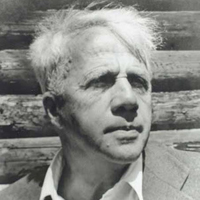Brown's Descent by Robert Frost: Summary and Analysis
The poem 'Brown's Descent' also known by the name 'The Willy-Nilly Slide' is written in the ballad form and appeared in 'Mountain Interval' (1916). In this poem Frost has drawn an unforgettable character in unmistakable terms.

Robert Frost (1874-1963)
The character in the poem called Brown lived in a high farm so that his lantern was visible to everyone for miles. Brown was a sober man, even by appearance. One day, Brown was hurled down by the strong wind. For him to climb the slippery slope was almost impossible; he "pursued his journey from field to field" without letting his lantern drop. One who might see Brown with his lantern at such an odd hour of the night must have guessed that he was celebrating some strange function. One might take it for granted that he had sold his farm away, that he was made the Master of the Grange - the association of farmers.
Brown had to face all kinds of trouble in the face of the gale for personal safety, though he was shaken completely. First Brown could not believe in what had happened to him, then he made himself satisfied to his fate. Brown did not think of standing there silently until the icy crust of January was melted. He, therefore, accepted his fate with utter humility. Brown faced his situation boldly and patiently, as a politician does at odd times, Therefore, Brown, who was gifted with mind, could not be kept standing and waiting at the slope base for long. Brown did not think of standing at the slope-foot in wait for the dissolution of the January ice from the snowy crust. He humbly accepted his fate and natural law.
He was now some two miles away from his farm. But when he saw that he couldn't go straight up, weak and aged as he was, despite his hard struggle, he chose the longer way home by road; a matter of several miles.
The poet is trying to justify himself here - quite characteristic of Frost. He has not kept Brown in a fix for long though his time was bad like an unsuccessful politician's. It would not have become a man like Brown, who was endowed with reasoning faculties.
In this poem Frost studies "a human character in lighter moods, the happy-go-lucky Brown sliding down the mountain". Brown lived on a lofty farm. Hence his activities were visible to everyone. Though Brown was taken astray by the gale, he neither lost his heart, nor accused Heaven, but accepted his fate most resolutely yet humbly.
Brown has been made to represent the American 'stock', the courageous spirit of that nation. In creating this character, great in heart and head as he is, the poet gives a free play to fancy. The reader feels sympathy for him and his lot. Brown is the one who has learnt to fight against the odds; one who has learnt to struggle hard like a "politician at odd seasons." His resoluteness is quite clear in his firm grip of the lantern: He reeled, he lurched, he bobbed, he checked; He fell and made the lantern rattle (But saved the light from going out.)
What Brown does in the face of adverse natural calamities, how he acts in the face of bad luck, these remind us of the New England spirit, the Yankee character. The sub-title of the poem "The Willy-dilly Slide" is indicative of the light mood of the poem, though the descent itself is very dangerous. In the words of Louis Untermeyer, "Brown has humor, there can be no doubt of it. And he also has character, firm Yankee character. In Brown's headlong descent there is something madcap and ridiculous and yet determined.”
Brown's Descent is "a poem of utmost simplicity of style, but it suggests some thought". The movement of the story is quick and engaging. It is a piece of sophisticated and intricate art, metrically and 'vocally'. The narrator seems to be rural and neighborly at first, later he turns out to be urban, "an authority on motor-cars". The poet has managed the gradations of tone and tempo with great felicity. There is a constant change of the metrical pattern in it.
Related Topics
The Silken Tent: Summary and Analysis
The Death of the Hired Man: Summary and Analysis
Neither Out Far nor In Deep: Summary and Analysis
West Running Brook: Summary and Analysis
Stopping by Woods on a Snowy Evening: Analysis
A Considerable Speck: Literary Analysis
A Considerable Speck: Critical Analysis
Mending Wall: Summary and Analysis
Home Burial: Summary and Analysis
After Apple Picking: Summary and Analysis
The Road Not Taken: Summary and Analysis
Fire and Ice: Summary and Analysis
Nothing Gold Can Stay: Summary and Analysis
Acquainted with the Night: Summary and Analysis
The Gift Outright: Summary and Analysis
Reluctance: Summary and Analysis
The Wood Pile: Summary and Analysis
 |
bachelorandmaster.com |